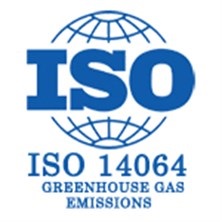Climate Change and Adaptation
Faced with the changing industrial structure and technological trend, enterprises must actively innovate for sustainable operation. Compal understands that relying on more mining, more consumption and more use of resources, it can no longer obtain a long-term competitive advantage. When society, market and nature require us to pay for the use of energy and natural resources, only by becoming “greener” than others can we completely make a change. Therefore, we shall actively respond to the operational risks brought by climate change, avoid impacts and losses, and seize relevant opportunities to gain market opportunities.
Greenhouse Gas Management
The impact, adjustment and mitigation of global climate change has become one of the most important environmental issues in the world. In order to strengthen the green practices of Compal, we must first understand the performance of our existing environmental actions, hoping to make continuous improvement from the inside out and create sustainable value for the Company. Compal uses the carbon emisssions inventory to evaluate the effectiveness of the greenhouse gas management, and confirm the accuracy of the data through a third-party verification unit.
Goals and Progress
| 2010 | The greenhouse gas survey was conducted for the first time using 2009 data, and was later validated by an outside party |
| Compal produced the world's first netbook that passed ISO14067/CD and PAS2050 certification for carbon footprint | |
| Compal participated in the Carbon Disclosure Project (CDP) for the very first time | |
| 2011 | Compal's netbook was certified by the Environmental Protection Administration in Taiwan for Carbon Footprint Label |
| 2013 | The greenhouse gas survey was expanded to include the Chengdu and Chongqing Plants |
| Participated in "Kunshan City Carbon Footprint Restructuring and Upgrade Project;" collaborated with the Industrial Technology Research Institute in promoting carbon footprint analysis among suppliers | |
| 2014 | For the first time, the greenhouse gas survey was expanded to include 3 business flights by employees of Taiwan Headquarters |
| 2015 | Organizational inventory was expanded to include the Nanjing and Bacheng Plants |
| 2017 | Organizational inventory was expanded to include the Chongqing and Renbao Plants. Both facilities completed the survey |
| 2018 | Organizational inventory was expanded to include Compal Brazil Plant |
| 2019 | Added and verified Scope 3 inventory for CQA |
| 2020 | Organizational inventory was expanded to include Compal Vietnam plant |
| 2021 | Organizational verification was expanded to include Compal Vietnam plant |
| 2022 | Organizational inventory expanded to include all subsidiaries in consolidated financial report |

The nature of Compal’s industry means that GHG emissions are concentrated in externally purchased energy. 8,008,485 kWh of solar power, 113,604,723 kWh of hydro power and 20,000,000 kWh of renewable energy certificates were also purchased to reduce actual carbon emissions by 80,762,012.682 KG CO2e.
With reference to the GHG Protocol Corporate Value Chain (Scope 3), Compal has identified scope 3 emissions based on its operational characteristics and product features, and devised corresponding reduction solutions.
In 2022, emissions per NT$1 million of revenue decreased by 0.142 compared to the 2019, and we are now striving to realize the target of a 50% reduction by 2030.Action Strategies and Plans
| Items | Scope of Implementation | Description |
| Renewable Energy | Kunshan, Nanjing, and Chongqing | 8,008,485 kWh of solar power, 113,604,723 kWh of hydro power and 20,000,000 kWh of renewable energy certificates were purchased to reduce actual carbon emissions by 80,762,012.682 KG CO2e. |
| E-vouchers | Taipei Headquarters | Every employee is entitled to 5 gift vouchers per year, including the three major holidays, their birthdays and end-of-year bonus. The use of e-voucher not only saves paper, conserves water resources but also prevents the waste of manpower and energy used in transportation. |
| "Energy and Environmental Monitoring" platform | Kunshan, Nanjing, Chongqing, Chengdu, Pingzhen | Build a real-time dashboard to understand the energy consumption and water consumption of the plant in time. Calculate daily energy usage budget based on production capacity and provide energy saving tips to employees at any time. To create new methods to improve energy efficiency, and to choose energy-saving products when energy-consuming equipment needs to be replaced. |
1. Energy Monitoring Information Platform
Compal’s Pingzhen plant is committed to improving environmental sustainability by upgrading the air-conditioning and electrical systems. By integrating the InSynerger Technology’s digital management system for electrical energy and the digital management system for air-conditioning, we have successfully realized precise monitoring and management of power consumption in the manufacturing process. At the same time, the application of high-tech intelligent algorithms provides optimized operation strategies to effectively save energy and reduce carbon emissions. With a total investment of NT$2,133K, the platform is expected to save 199,740kWh of electricity per year, which is equivalent to a reduction of 101 tons of CO2e. The platform has also been externally verified by the Foundation of Taiwan Industry Service to ensure the accuracy of the information. Relevant validation documents were also provided to the IDA members' review.
2. Carbon Management Information Platform
Compal participated actively in suppliers' carbon reduction project and established a carbon management platform (Chase Sustainability Carbon Management Platform). We not only provide education and training to suppliers, but also help them build inventory capabilities through platform tools. We believe that this will help suppliers gradually realize their carbon reduction targets and at the same time build a net-zero foundation for our country. The total amount of investment is NT$4,972K, and the benefits of this project are mainly in the quantification and integration of carbon information in the supply chain. A third party will verify the results of the project. And the results will be reported to IDA members for review to ensure the carbon reduction results.
